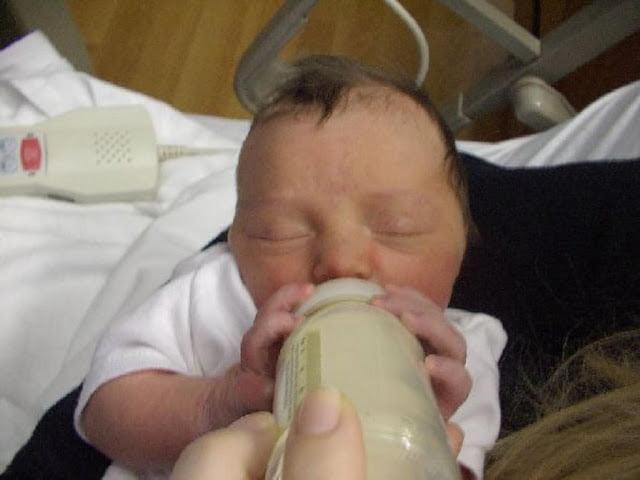Embarking on the journey of parenthood can be a fascinating, yet challenging, experience. As a mother and doctor, I’ve witnessed the trials and tribulations of helping little ones establish healthy sleep patterns. With a myriad of factors contributing to your baby’s sleep behavior, it’s essential to understand their needs and find the best ways to assist them in achieving sound slumber.
In this article, we delve into the importance of sleep for your baby’s development, the reasons behind sleep resistance, and how to create a cozy sleep environment. We also share soothing sleep strategies, tips on navigating nighttime troubles, and when to seek professional help. As you explore this comprehensive guide, I hope you’ll gain valuable insights and practical advice to support you and your baby in the world of sleep.
Table of Contents
- The Sleepy Wonders of Parenthood
- Reasons Behind Your Baby’s Sleep Resistance
- Creating a Cozy Sleep Environment
- Soothing Sleep Strategies
- Navigating Nighttime Sleep Troubles
- When to Seek Professional Help

| Heading | Key Takeaway |
|---|---|
| The Sleepy Wonders of Parenthood | Establishing a sleep routine is crucial for your baby’s health and well-being. |
| Understanding the Importance of Sleep for Your Baby | Adequate sleep is vital for your baby’s growth, development, and overall health. |
| Reasons Behind Your Baby’s Sleep Resistance | Identify the causes of sleep resistance, such as growth spurts, teething, or overstimulation, to address them effectively. |
| Creating a Cozy Sleep Environment | A comfortable and relaxing sleep environment is essential for helping your baby settle down and sleep well. |
| Soothing Sleep Strategies | Implement calming techniques, such as swaddling, lullabies, or massages, to help your baby feel secure and ready for sleep. |
| Navigating Nighttime Sleep Troubles | Respond calmly and consistently to your baby’s nighttime needs, and encourage self-soothing when appropriate. |
| When to Seek Professional Help | Consult a pediatrician or sleep specialist if you suspect persistent sleep problems or sleep disorders. |
The Sleepy Wonders of Parenthood
Understanding the Importance of Sleep for Your Baby
Slumbering peacefully, your baby embarks on a rejuvenating journey that fuels their development and growth. Sleep is indispensable for your little one’s cognitive, emotional, and physical well-being. During these precious hours of rest, the brain consolidates memories, enhances learning capabilities, and restores the body’s energy reserves.
A baby’s sleep is vital for their immune system, which is continually learning to protect them from the myriad of bacteria and viruses they encounter. A well-rested baby is more resilient and better equipped to face the challenges of their ever-expanding world. So, it’s no wonder that ensuring your baby gets sufficient sleep is paramount for their overall health and happiness.
However, achieving this seemingly simple goal can sometimes prove to be an arduous task. As a parent, you play a pivotal role in fostering healthy sleep habits for your little one. By understanding the significance of sleep, you can prioritize and nurture this essential aspect of your baby’s life.
See Also: When My Baby Talks: A Parent’s Guide to Communication
Why It’s Crucial to Establish a Sleep Routine
Establishing a sleep routine is an indispensable step in fostering healthy sleep habits. Consistency is key when it comes to bedtime, as it helps your baby’s internal clock adapt to a predictable pattern. This circadian rhythm, once attuned, will work in harmony with your baby’s natural sleep-wake cycles, making it easier for them to drift off into dreamland and stay asleep for longer stretches.
A well-structured sleep routine also provides a sense of security and comfort for your baby. Familiar bedtime rituals signal that it’s time to wind down and prepare for sleep, thereby reducing anxiety and promoting relaxation. By creating a nurturing and consistent environment, you’re laying the foundation for a lifetime of healthy sleep habits.
Furthermore, a regular sleep routine benefits parents too! As your baby learns to sleep for longer periods, you too can enjoy some much-needed rest and rejuvenation. A well-rested parent is better equipped to handle the challenges and joys of parenthood. So, don’t underestimate the power of a consistent sleep routine – it’s a win-win for both you and your baby.
See Also: Navigating the Complexities of Breastfeeding: From Self-Care to Allergies
Reasons Behind Your Baby’s Sleep Resistance
Growth Spurts and Sleep Regression
During growth spurts, babies experience rapid physical and cognitive development, which can temporarily disrupt their sleep patterns. The brain is buzzing with newfound skills and abilities, making it challenging for your little one to switch off and settle into slumber. Additionally, increased hunger during growth spurts may lead to more frequent nighttime awakenings for feedings.
Sleep regression is another common culprit behind sleep resistance. As your baby reaches developmental milestones, their sleep patterns may regress temporarily, causing them to wake more often or have difficulty falling asleep. These regressions typically occur around 4, 9, and 18 months of age and are a normal part of your baby’s development. With patience and consistency, you can help guide them back to their usual sleep patterns.
Understanding that growth spurts and sleep regression are temporary phases can provide you with some solace during these challenging times. Keep in mind that every baby is unique, and the duration of these phases may vary. Remember to be patient, and soon enough, your little one will be back on track with their sleep routine.
See Also: 10 Pregnancy Myths Debunked: Get the Facts for a Healthy and Informed Pregnancy
Teething Troubles and Discomfort
Teething is an inevitable part of your baby’s journey, and it can wreak havoc on their sleep. The discomfort and pain associated with emerging teeth can cause your little one to be more restless and wakeful during the night. Some babies may also experience increased drooling, gum swelling, and a slight increase in temperature during this time.
Offering comfort measures such as gentle gum massages, cold teething rings, or even over-the-counter pain relievers (as recommended by your pediatrician) can help ease your baby’s discomfort and improve their sleep. Remember, teething is a temporary phase, and with time, your baby will overcome this hurdle and return to more restful nights.
See Also: The Ultimate Guide to Baby Teething: Signs, Soothing Strategies, and Remedies
Separation Anxiety and Clinginess
As your baby’s awareness of the world expands, they may begin to experience separation anxiety. This newfound understanding of object permanence – the realization that you continue to exist even when out of sight – can cause distress and make it difficult for your baby to settle down and sleep independently. Clinginess and increased wakefulness are common during this phase, typically peaking around 8 to 10 months of age.
To help your baby navigate separation anxiety, practice brief moments of separation during the day, reassuring them of your presence and return. At bedtime, establish a comforting routine and provide a transitional object, such as a small blanket or soft toy, to offer solace during your absence. With consistency and reassurance, your baby will learn to manage their anxiety and eventually sleep more peacefully.
See Also: The Loving Embrace: Breastfeeding, Weaning, and Relationships
Overstimulation and Sensory Overload
The world is a fascinating place for a baby, brimming with captivating sights, sounds, and experiences. However, this constant barrage of sensory input can sometimes become overwhelming, leading to overstimulation and difficulty settling down for sleep. Overstimulated babies may become fussy, irritable, and have trouble falling asleep or staying asleep.
To prevent overstimulation, create a calm and soothing environment, especially during the hours leading up to bedtime. Limit exposure to bright lights, loud noises, and excessive screen time. Instead, engage in quiet activities such as reading, gentle play, or a warm bath to help your baby wind down and prepare for sleep.
See Also: A Lullaby to Remember: The Power of Music in Your Baby’s Development
Illness or Discomfort Keeping Them Awake
When your baby is unwell, their sleep may be disrupted. Common ailments like colds, ear infections, or gastrointestinal issues can cause discomfort and make it challenging for your little one to sleep soundly. Additionally, certain medical conditions, such as reflux or allergies, can impact your baby’s ability to sleep well.
Monitor your baby for any signs of illness and consult your pediatrician for guidance on managing their symptoms. Ensuring your baby receives appropriate treatment and comfort measures will help them recover more quickly and return to a regular sleep pattern.
See Also: A Parent’s Guide to OTC Medicines and Natural Remedies for Children
Creating a Cozy Sleep Environment
Setting the Stage: Your Baby’s Sleep Space
Creating a sleep-conducive environment is essential to promote restful sleep for your baby. Your baby’s sleep space should be quiet, dark, and comfortable. Invest in blackout curtains to block out any external light, and consider using a white noise machine to mask disruptive sounds.
Keep the room clutter-free and designate the sleep area solely for sleeping to create a clear association between the space and rest. A crib or bassinet with a firm mattress and fitted sheet is all that’s needed to provide a safe and cozy sleep surface for your baby.
See Also: Empowering Nursing Moms: Nutrition, Hydration, and Babywearing Secrets
Temperature: Finding the Sweet Spot for Sleep
Ensuring that your baby’s sleep environment is at an optimal temperature can significantly impact their sleep quality. Experts recommend maintaining a room temperature between 65°F and 70°F (18°C and 21°C) for the best sleep conditions. Dress your baby in light, breathable layers to prevent overheating, and adjust as necessary based on your baby’s comfort and the ambient temperature.
Be attentive to signs that your baby may be too hot or too cold during sleep, such as excessive sweating or cool extremities, and make adjustments accordingly. Creating a comfortable sleep environment will help your baby settle more easily and enjoy a more restful slumber.
A Symphony of Soothing Sounds
Integrating calming sounds into your baby’s sleep space can help them relax and drift off to dreamland. White noise machines, soft music, or nature sounds can provide a soothing backdrop for sleep and mask any disruptive noises that might rouse your little one.
Lullabies have long been cherished by parents as a means to help babies relax and fall asleep. The gentle melodies and comforting rhythms create a calming atmosphere, perfect for bedtime. Experiment with different sounds to discover what resonates most with your baby and helps them settle down for a good night’s sleep.
See Also: A Lullaby to Remember: The Power of Music in Your Baby’s Development
Calming Aromas to Encourage Sleep
Introducing gentle and soothing scents into your baby’s sleep environment can further enhance their relaxation and promote restful sleep. Aromatherapy, using natural essential oils like lavender or chamomile, can create a calming ambiance. However, always use caution when introducing new scents and be sure to choose products specifically designed for use with babies.
Consider using a diffuser or scent-specific baby products, such as lotions or oils, to incorporate calming aromas into your baby’s bedtime routine. As with any new product, monitor your baby for any adverse reactions and consult your pediatrician if you have concerns.
Soothing Sleep Strategies
The Power of a Predictable Bedtime Routine
Establishing a consistent and predictable bedtime routine can work wonders in helping your baby understand when it’s time to sleep. By engaging in the same calming activities each night, you create a sense of familiarity and comfort for your little one.
Your bedtime routine may include activities such as a warm bath, a gentle massage, reading a story, or singing a lullaby. Whatever you choose, consistency is key. Over time, your baby will associate these activities with sleep, making it easier for them to wind down and prepare for bedtime.
See Also: The Loving Embrace: Breastfeeding, Weaning, and Relationships
Swaddling: Your Baby’s Warm and Cozy Cocoon
Swaddling is an age-old practice that involves wrapping your baby snugly in a soft blanket, creating a secure and cozy environment that mimics the feeling of being in the womb. Many babies find comfort in the gentle pressure of a swaddle, which can help reduce startle reflexes and facilitate longer stretches of sleep.
When swaddling your baby, ensure that their hips and legs can move freely to prevent issues like hip dysplasia. Keep in mind that not all babies enjoy being swaddled, so pay attention to your baby’s cues and preferences.
The Magic of Lullabies and White Noise
Lullabies and white noise are tried-and-true sleep aids that can help soothe your baby to sleep. The soft melodies of lullabies provide a comforting and familiar sound for your baby, while white noise mimics the constant sounds they heard while in the womb.
Experiment with different types of lullabies and white noise to find the combination that works best for your baby. You may find that a particular song or sound is especially effective at calming them down and preparing them for sleep.
See Also: Capturing Baby’s Journey: Unique Milestone Moments in Their First Year
Massage and Touch: The Ultimate Comfort
Gentle touch and massage can provide immense comfort to your baby and aid in relaxation before bedtime. The skin-to-skin contact and calming strokes of infant massage can help release tension, promote relaxation, and deepen the bond between you and your baby.
Experiment with different massage techniques and strokes, focusing on areas that seem to bring the most relaxation to your baby. Remember to use a gentle touch and avoid using any oils or lotions that may cause irritation. As you incorporate massage into your baby’s bedtime routine, observe their reactions to find the approach that works best for them.
Navigating Nighttime Sleep Troubles
When Your Baby Wakes Up in the Middle of the Night
It’s natural for babies to wake up during the night, especially during the first few months of life. When your baby wakes up, try to remain calm and patient. Assess their needs by checking for a wet diaper, hunger cues, or signs of discomfort. Addressing these needs promptly can help your baby settle back to sleep more easily.
If your baby continues to have difficulty falling back asleep, try soothing techniques such as gentle rocking, humming a lullaby, or offering a pacifier. Remember, every baby is different and what works for one may not work for another.
See Also: A Comprehensive Guide to Breastfeeding Multiples, Staying Active, and Mental Health
Managing Midnight Feedings and Diaper Changes
Navigating nighttime feedings and diaper changes can be challenging, but with a little planning and organization, you can minimize disruptions to your baby’s sleep. Keep all the necessary supplies within arm’s reach, and try to maintain a calm and quiet environment during these nighttime interactions.
When feeding your baby at night, avoid turning on bright lights or engaging in stimulating activities. Keep the atmosphere as soothing as possible to encourage your baby to return to sleep after feeding or a diaper change.
See Also: 10 Pregnancy Myths Debunked: Get the Facts for a Healthy and Informed Pregnancy
Teaching Your Baby to Self-Soothe
As your baby grows and develops, it’s essential to teach them the skills to self-soothe and fall asleep independently. Self-soothing techniques can include sucking on a pacifier, stroking a soft blanket, or hugging a favorite stuffed animal.
Encourage self-soothing by placing your baby in their crib when they’re drowsy but still awake. This allows them to learn to fall asleep without your assistance. Be patient and consistent, as it may take some time for your baby to develop these skills.
When to Seek Professional Help
Identifying Persistent Sleep Problems
While some sleep challenges are common during the first year of your baby’s life, persistent sleep problems may warrant further investigation. If your baby continues to have difficulty falling asleep or staying asleep despite consistent sleep routines and soothing strategies, it may be time to consult a professional.
Signs of a potential sleep issue may include excessive fussiness or irritability, difficulty breathing during sleep, or an inability to sleep through the night after several months. Keep track of your baby’s sleep patterns and behaviors, as this information can be helpful when discussing concerns with a pediatrician or sleep specialist.
Consulting a Pediatrician or Sleep Specialist
If you suspect your baby may have a sleep disorder or other issue affecting their sleep, don’t hesitate to consult a pediatrician or sleep specialist. These professionals can help identify any underlying causes and provide guidance on appropriate treatments or interventions.
Be prepared to discuss your baby’s sleep history, routines, and any concerns you may have. Providing detailed information can help the professional make a more accurate assessment of your baby’s sleep needs and challenges.
Remaining Patient and Supportive as Your Baby Learns to Sleep
Teaching your baby healthy sleep habits can be a challenging process, but it’s important to remain patient and supportive throughout the journey. Every baby is unique, and it may take some time to find the right combination of strategies that work for your little one.
As you navigate the sleepy wonders of parenthood, always remember to be kind to yourself and trust your instincts. With consistency, perseverance, and a little bit of trial and error, you’ll find the path to a good night’s sleep for both you and your baby.
See Also: The Ultimate Guide to Baby Teething: Signs, Soothing Strategies, and Remedies
Conclusion
As we reach the end of this enlightening journey, it’s crucial to remember that every baby is unique. Their sleep habits and needs may differ, so it’s essential to approach each situation with patience and understanding. As a mother and doctor, I’ve found that perseverance and adaptability are vital in addressing sleep-related challenges.
Remember to trust your instincts and don’t hesitate to reach out for professional help if you’re concerned about your baby’s sleep patterns. With time, consistency, and a toolbox of soothing techniques, you’ll help your baby develop healthy sleep habits that will benefit them throughout their lives. Cherish the moments of quiet slumber, and embrace the challenges as opportunities to bond with your little one and grow as a parent.
Frequently Asked Questions
1. What can I do if my baby refuses to sleep?
Try creating a consistent bedtime routine, providing a comfortable sleep environment, and utilizing soothing techniques such as swaddling, lullabies, or gentle massages. It may take time and patience to identify the most effective strategies for your baby.
2. How can I tell if my baby is experiencing sleep regression?
Signs of sleep regression may include increased fussiness, frequent nighttime awakenings, or resistance to napping. It’s essential to remain patient and consistent with your baby’s sleep routine during these periods.
3. What factors can cause my baby to resist sleep?
Common factors include growth spurts, teething discomfort, separation anxiety, overstimulation, and illness. Identifying the root cause can help you address the issue and improve your baby’s sleep quality.
4. How can I create a cozy sleep environment for my baby?
Ensure your baby’s sleep space is safe and comfortable, maintain an optimal room temperature, use soothing sounds or white noise, and consider incorporating calming aromas such as lavender to encourage relaxation.
5. What should I do when my baby wakes up in the middle of the night?
Respond to your baby’s needs calmly and quietly, limiting interaction and stimulation. If necessary, change their diaper or offer a feeding, then use soothing techniques to help them return to sleep.
6. When should I seek professional help for my baby’s sleep issues?
If you suspect your baby has a sleep disorder or persistent sleep problems, consult a pediatrician or sleep specialist for guidance on appropriate treatments or interventions.
7. How can I remain patient and supportive as my baby learns to sleep?
Remember that every baby is unique and may require time to establish healthy sleep habits. Trust your instincts, be kind to yourself, and maintain consistency in your baby’s sleep routine to ensure long-term success.








